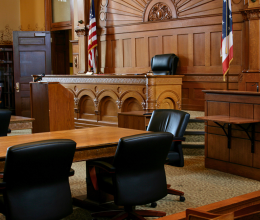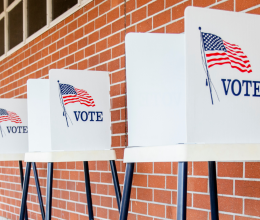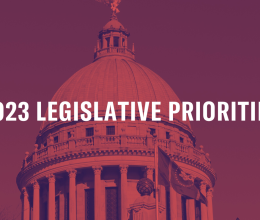Plaintiffs call for changes in Supreme Court election districts to ensure an equal opportunity for Black Mississippians to elect candidates of choice
FOR IMMEDIATE RELEASE:
GREENVILLE, Miss. — Mississippi civic leaders today challenged state Supreme Court district lines that have gone unchanged for more than 35 years because those lines dilute the voting strength of Black residents in state Supreme Court elections, in violation of the Voting Rights Act of 1965 and the U.S. Constitution.
The American Civil Liberties Union, ACLU of Mississippi, Southern Poverty Law Center (SPLC) and Simpson Thacher & Bartlett LLP filed the lawsuit on behalf of individual Black civic leaders, including business and civic leader Dyamone White; Ty Pinkins, a 20-year Army veteran and Georgetown Law graduate; educator Constance Slaughter Harvey-Burwell; and Mississippi Senate Minority Leader Derrick Simmons of Greenville.
Mississippi’s population is almost 40% Black—a greater proportion than any other state. Yet in the 100 years that Mississippi has elected its Supreme Court, there have only been four Black justices ever to sit on that body, and never more than one at a time. It has been nearly 20 years since a Black jurist won election to the Court in a contested election. The reason for this state of affairs is that the current Supreme Court districts dilute the voting strength of Black Mississippians.
Plaintiffs are seeking to have the districts redrawn so that Black voters have an equal opportunity to elect candidates of their choice. As it stands, none of the three Supreme Court districts are drawn with a Black voting age majority. But current District 1, which includes Jackson and part of the Mississippi Delta, could easily be redrawn, consistent with traditional principles, to have a majority of eligible Black voters. Especially in light of the high degree of racial polarization in voting in Mississippi, such a change is needed to ensure that Supreme Court elections comply with federal law and allow Black Mississippians a fair and equal opportunity to elect candidates of their choosing.
Dyamone White said: “Equal opportunities to ascend to high leadership roles like State Supreme Court justice will draw in more potential leaders committed to building their lives and careers in Mississippi. As a business owner who plans to build a family here in Mississippi, I am committed to building up our State. That means creating Supreme Court district maps that give Black Mississippians fair representation and equal opportunity.”
Ty Pinkins said: “A Black citizen from the Mississippi Delta should have just as much of an opportunity to elect candidates of their choice to the Supreme Court as anyone else. And a Black lawyer from the Delta should have just as much of an opportunity to serve on the Court as anyone else.”
Constance Slaughter Harvey-Burwell said: “As an educator and a parent, it is imperative to me that our government institutions represent all of us. Our young people should be able to see themselves reflected in their representatives. That includes in the Mississippi Supreme Court.”
“Thirty-five years ago, Black lawmakers objected to the current districts. The lack of proper representation today is evidence that they were right in their objection. It’s past time to correct these unlawful maps, said Jarvis Dortch, Executive Director of ACLU of Mississippi.
“Mississippi’s Supreme Court districts dilute the voice and the votes of Black Mississippians in violation of federal law,” said Ari Savitzky, Senior Staff Attorney at the ACLU’s Voting Rights Project. “Mississippi can and must do better. The Supreme Court of Mississippi should reflect the people of Mississippi.”
“Although the Black population in Mississippi has been growing and now makes up well over one third of the state’s population, none of the three districts used to elect the justices of the Mississippi Supreme Court includes a Black voting-age majority,” said Liza Weisberg, staff attorney with SPLC’s voting rights practice group. “These districts must be redrawn to give Black voters an equal opportunity to elect candidates of their choice to the Mississippi Supreme Court, whose rulings directly and profoundly affect the lives of all Mississippians.”
“The right to free and fair elections is a central pillar of our nation’s democracy,” said Jon Youngwood, Co-Chair of Simpson Thacher’s Litigation Department. “Both the U.S. Constitution and the Voting Rights Act make clear that all citizens must have an equal opportunity to participate in the political process. We look forward to presenting our claims to the Court.”
BACKGROUND
Section 2 of the Voting Rights Act makes it unlawful to deny minority groups an equal opportunity to participate in the political process. That is what the challenged districting scheme does to Black Mississippians. The State’s Black population is sufficiently numerous and concentrated to form a majority in one of the three at-large voting districts that Mississippi uses to elect its nine Supreme Court justices. Yet none of the three districts has a Black majority. And voting is severely racially polarized in Mississippi, such that in elections using the current districts, Black voters typically cannot elect candidates of their choice. Mississippi’s Supreme Court districts unfairly divide up the State’s Black population, diluting Black voters’ political strength in violation of the Voting Rights Act, and discriminating against Black Mississippians in violation of the U.S. Constitution.





